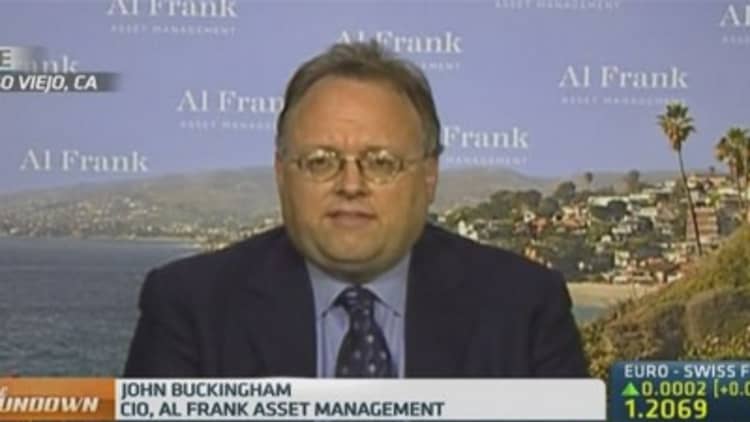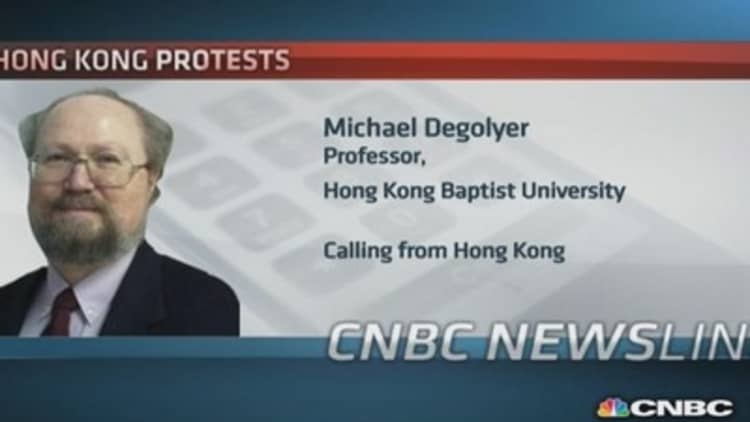
While protesters in Hong Kong are braving tear gas to battle for democratic ideals, stock traders are lining up bets on how to make money on the turmoil.
"[Tiananmen Square] created opportunities for folks if they were able to have a strong stomach and pick up some stocks," said John Buckingham, chief investment officer at Al Frank Asset Management, which has around $4 billion under management.
Read More Live blog: Hong Kong's night of unrest
"Investors will be anticipating the events that might occur and generally speaking, they'll overreact," he told CNBC Tuesday. "Investors can take advantage of that."
He's eyeing the drop in HSBC's U.S.-listed shares as a potential opportunity; the stock is down over 4 percent so far this week.
The Hang Seng Index dropped 3.1 percent this week, following a 2.6 percent decline last week, before riot police fired tear gas and launched a baton charge against Hong Kong pro-democracy protestors early Monday, a factor in the protests' increasing size since then. Hong Kong's markets are closed Wednesday and Thursday for China's National Day holidays.
But others aren't necessarily jumping on the bargain-hunting band wagon.
Read More Here's how the protests will hit Hong Kong's economy
"[Hong Kong's] markets historically decline in advance of political demonstrations and have been quick to rebound after the events themselves," Nomura said in a note earlier this week. But it added, "Such political ructions this time offer a concrete catalyst for investors to reduce Hong Kong exposure on increasingly adverse macroeconomic considerations."
Nomura was already recommending an underweight position on Hong Kong equities, citing concerns that the Federal Reserve's move toward normalizing its policy will push up U.S. interest rates and strengthen the U.S. dollar, pressuring the territory's property market and banking sector due to the Hong Kong dollar's peg to the greenback.
"A relatively greater build-up of post-crisis financial leverage in Hong Kong compared to regional peers also leaves the local economy and equity market comparatively vulnerable," Nomura said.
Read More Who needs who the most: Hong Kong or China?
The bank is also negative on Hong Kong-listed consumer, property, hotel and airline stocks, citing "disorder" in the streets key to the tourism and high-end retail and hospitality sectors and the potential erosion in the city's attractiveness for mainland tourists and potential property buyers. It specifically advises switching out of watch and jewelry names as they are likely to take a hit from a tourism decline.

To be sure, Nomura does see potential opportunities in the pullback in Hong Kong-listed stocks of China-based businesses, but it isn't alone in seeing broader risks to the territory's market. Goldman Sachs was also already underweight on Hong Kong stocks.
"The latest incident may catalyze an underperforming trend for pure-Hong Kong-based exposure," Goldman said in a note Tuesday, adding it expects that if the unrest persists, investors may demand higher risk premiums.
Read More Images of Hong Kong's violent weekend
But it too sees the risks as bigger than just the latest protests.
"Our cautious view is mainly due to the dual macro headwinds facing the Hong Kong economy, specifically the normalization of U.S. monetary policy that we expect over the next several years and the moderation of economic growth in China, particularly the slowdown of Chinese demand for luxury goods," Goldman said.
Others are also citing concerns that the protests' effects will be longer term than bargain hunters may expect.
Read More How Hong Kong protests affect the big money
"If the current political situation is unchanged for a long period of time, or worsens, the impact could last for the whole of the fourth quarter, which is the peak season for Christmas sales," noted Patrick Wong, an analyst at BNP Paribas, in a note Tuesday. From 2009-2013, 27 percent of annual retail sales of consumer goods were posted in the fourth quarter, he noted.
It's not just a risk for the retail outlets, with Wong noting that property landlords Hysan, Swire Properties, Wharf and Champion REIT all having exposure to retail outlets in the districts affected by the protests.
—By CNBC.Com's Leslie Shaffer; Follow her on Twitter @LeslieShaffer1


